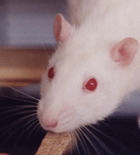16th Mar 2009
Emergency Help for Rats with Respiratory Problems
The following is a technique my husband picked up at the Neonatal Care Unit. We have applied it with great success to our rescued rats when they are in respiratory distress or during gasping attacks .
- Take the animal and hold her gently in a comfortable position with one hand.
- Tap with the tips of two (or three) fingers hard (but not too hard) on her ribcage on the
sides of her body, directly above the lungs. You should faintly hear the tapping sounds.
- Alternate tapping on both of her sides.
- Make a short break.
- Repeat for a couple of minutes or until the rat gets restless.
- Reward with kisses, petting and/or a special treat.
Our rats really respond well to this emergency intervention.
We apply this treatment also when acute gasping attacks are not an issue to relieve respiratory distress (i.e., when we hear that fluids have accumulated in the lungs).
You can do this anytime, when you watch a movie, when you sit still, or on your trip to your veterinarian - whenever you have both hands free to help your pet.
This is a temporary solution only; you have to consult your vet to learn how to best resolve the underlying problem.
Aside from being a supportive or an emergency intervention, this simple treatment can help tighten the bond between you and your pet. Our rats usually enjoy it and start licking our hands soon after we start with this procedure. They really don’t seem to get tired of it.
The following is a technique my husband picked up at the Neonatal Care Unit. We have applied it with great success to our rescued rats when they are in respiratory distress or during gasping attacks .
- Take the animal and hold her gently in a comfortable position with one hand.
- Tap with the tips of two (or three) fingers hard (but not too hard) on her ribcage on the
sides of her body, directly above the lungs. You should faintly hear the tapping sounds.
- Alternate tapping on both of her sides.
- Make a short break.
- Repeat for a couple of minutes or until the rat gets restless.
- Reward with kisses, petting and/or a special treat.
Our rats really respond well to this emergency intervention.
We apply this treatment also when acute gasping attacks are not an issue to relieve respiratory distress (i.e., when we hear that fluids have accumulated in the lungs).
You can do this anytime, when you watch a movie, when you sit still, or on your trip to your veterinarian - whenever you have both hands free to help your pet.
This is a temporary solution only; you have to consult your vet to learn how to best resolve the underlying problem.
Aside from being a supportive or an emergency intervention, this simple treatment can help tighten the bond between you and your pet. Our rats usually enjoy it and start licking our hands soon after we start with this procedure. They really don’t seem to get tired of it.
 Posted by admin under
Posted by admin under  Home Remedies & News Bits
Home Remedies & News Bits  No Comments »
No Comments »
 Congestive heart failure (CHF) is a disease in which a weakened heart muscle is unable to effciently pump blood through the body. CHF can be caused by hypertension, cardiomyopathy, diabetes, coronary artery disease, heart attacks, or defective heart valves. CHF is common in some breeds of dogs or older pocket pets such as pet rats and is often treated with conventional medicine. However, CoQ10 and L-carnitine and other supplementation may support conventional treatment regimen or can be used for prevention purposes.
Congestive heart failure (CHF) is a disease in which a weakened heart muscle is unable to effciently pump blood through the body. CHF can be caused by hypertension, cardiomyopathy, diabetes, coronary artery disease, heart attacks, or defective heart valves. CHF is common in some breeds of dogs or older pocket pets such as pet rats and is often treated with conventional medicine. However, CoQ10 and L-carnitine and other supplementation may support conventional treatment regimen or can be used for prevention purposes.